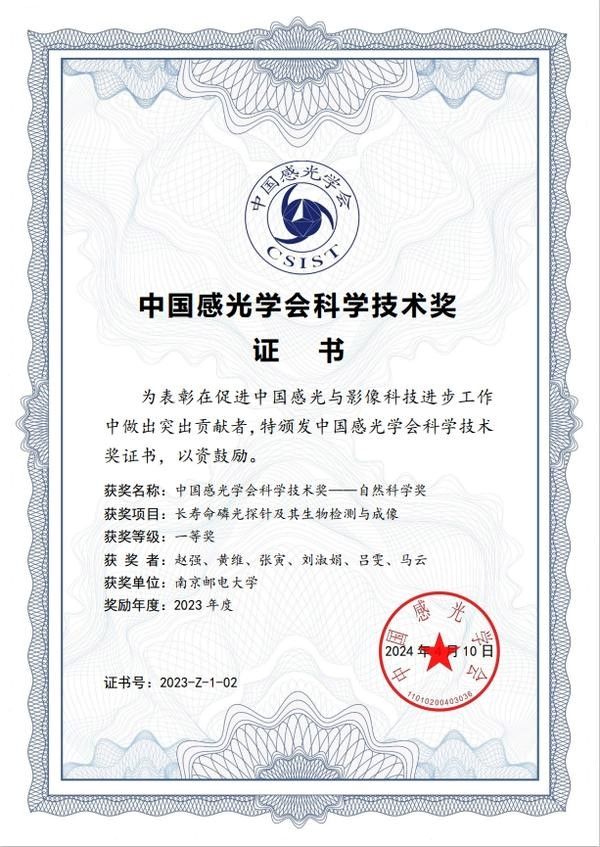Recently, the CSIST announced the decision to award the 2023 CSIST Science and Technology Awards. After a rigorous evaluation process, including qualification review, expert evaluation by the award assessment group, deliberation by the award evaluation committee, voting, approval by the executive council, and website public notification, Professor Zhao Qiang’s team from our university has been honored with the First Prize in the Natural Science category for their project titled “Long-lifetime Phosphorescent Probes and Their Applications in Biological Sensing and Imaging.” This project, with a team comprising Zhao Qiang, Huang Wei, Zhang Yin, Liu Shujuan, Lv Wen, and Ma Yun, and Nanjing University of Posts and Telecommunications as the sole completing institution, stands as the only recipient of the First Prize in the natural science category for the 2023 CSIST Science and Technology Awards.

Award certificate
The awarded project addresses the challenges of low detection accuracy and low signal-to-noise ratio associated with conventional fluorescence probes in biomedical fluorescent sensing and imaging. It achieved original breakthroughs by developing novel phosphorescent probes and imaging techniques. By revealing the regulation principles of excited states, the project proposed a new strategy for the multidimensional modulation of phosphorescent materials, leading the development of dual-emissive phosphorescent materials internationally and providing an important theoretical foundation for the breakthrough of biomedical imaging technologies. Furthermore, the research utilized the advantages of tunable phosphorescence wavelengths and long emission lifetimes to develop a new system of phosphorescent ratiometric probes and time-resolved luminescent biological imaging techniques. It effectively overcame the challenges of low detection accuracy and low signal-to-noise ratio associated with conventional fluorescence probes in biological imaging, providing an efficient solution for high-precision detection and high signal-to-noise ratio imaging with significant economic and practical value. The project resulted in the publication of 53 high-quality papers, with 10 representative papers published in prestigious international journals such as Nat Commun, J Am Chem Soc, Angew Chem Int Ed, and Adv Mater. These papers have been cited over 1,500 times by numerous renowned scholars in SCI-indexed journals. The project had been granted 20 Chinese invention patents. These achievements hold great significance for the development of new luminescent materials and biotechnologies with independent intellectual property rights in China.

The CSIST, as a part of the China Association for Science and Technology, presents the “CSIST Science and Technology Awards” every two years to recognize outstanding contributions in the field of imaging science and technology research, innovation, and entrepreneurship across China. These awards, including the Technical Invention Award, Natural Science Award, Scientific and Technological Progress Award, and Young Scientist Award, are regarded as a guiding light for the development of the imaging science and technology in China.
(Authored by Zhang Yin and Zhang Yihua; Reviewed by Ling Haifeng and Song Fuming; Edited by Wang Cunhong; Approved by Zhang Feng)



